De Deense dichteres, schrijfster en essayiste Inger Christensen werd geboren op 16 januari 1935 in de stad Vejle aan de oostkust van Jutland. Zie ook mijn blog van 16 januari 2008 en ook mijn blog van 16 januari 2009.
Uit: alphabet
(1) die aprikosenbäume gibt es, die aprikosenbäume gibt es
(2) die farne gibt es; und brombeeren, brombeeren
und brom gibt es; und den wasserstoff, den wasserstoff
(3) die zikaden gibt es; wegwarte, chrom
und zitronenbäume gibt es;
die zikaden gibt es; die zikaden, zeder, zypresse, cerebellum
(4) die tauben gibt es; die träumer, die puppen
die töter gibt es; die tauben, die tauben;
dunst, dioxin und die tage; die tage
gibt es; die tage den tod; und die gedichte
gibt es; die gedichte, die tage, den tod
(5) den herbst gibt es; den
nachgeschmack und das nachdenken
gibt es; und das insichgehn gibt es; die engel,
die witwen und den elch gibt es; die einzelheiten
gibt es, die erinnerung, das licht der erinnerung;
und das nachleuchten gibt es, die eiche und die ulme
gibt es, und den wacholderbusch, die gleichheit, die einsamkeit
gibt es, und die eiderente und die spinne
gibt es,
und den essig gibt es, und die nachwelt, die nachwelt
(6) den fischreiher gibt es, mit seinem graublau gewölbten
rücken gibt es ihn, mit seinem federschopf schwarz
und seinen schwanzfedern hell gibt es ihn; in kolonien
gibt es ihn; in der sogenannten Alten Welt;
gibt es auch die fische; und den fischadler, das schneehuhn
den falken; das mariengras und die farben der schafe;
die spaltprodukte gibt es und den feigenbaum gibt es;
die fehler gibt es, die groben, die systematischen,
die zufälligen; die fernlenkung gibt es und die vögel;
und die obstbäume gibt es und das obst im obstgarten wo
es die aprikosenbäume gibt, die aprikosenbäume gibt,
in ländern wo die wärme genau die farbe im fleisch
erzeugen wird die aprikosenfrüchte haben
(…)
Vertaald door Hanns Grössel
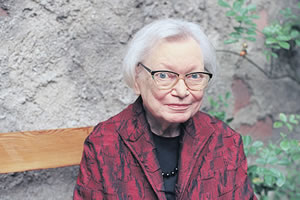
Inger Christensen (16 januari 1935 – 2 januari 2009)
De Amerikaanse schrijfster en essayiste Susan Sontag werd geboren op 16 januari 1933 in New York. Zie ook mijn blog van 16 januari 2007 en ook mijn blog van 16 januari 2008 en ook mijn blog van 16 januari 2009.
Uit: Regarding the Pain Of Others
„In June 1938 Virginia Woolf published Three Guineas, her brave, unwelcomed reflections on the roots of war. Written during the preceding two years, while she and most of her intimates and fellow writers were rapt by the advancing fascist insurrection in Spain, the book was couched as the very tardy reply to a letter from an eminent lawyer in London who had asked, “How in your opinion are we to prevent war?” Woolf begins by observing tartly that a truthful dialogue between them may not be possible. For though they belong to the same class, “the educated class, a vast gulf separates them: the lawyer is a man and she is a woman. Men make war. Men (most men) like war, since for men there is “some glory, some necessity, some satisfaction in fighting” that women (most women) do not feel or enjoy. What does an educated — read: privileged, well-off — woman like her know of war? Can her recoil from its allure be like his?
Let us test this “difficulty of communication,” Woolf proposes, by looking together at images of war. The images are some of the photographs the beleaguered Spanish government has been sending out twice a week; she footnotes: “Written in the winter of 1936-37.” Let’s see, Woolf writes, “whether when we look at the same photographs we feel the same things.” She continues:
‚This morning’s collection contains the photograph of what might be a man’s body, or a woman’s; it is so mutilated that it might, on the other hand, be the body of a pig. But those certainly are dead children, and that undoubtedly is the section of a house. A bomb has torn open the side; there is still a bird-cage hanging in what was presumably the sitting room . . .’
The quickest, driest way to convey the inner commotion caused by these photographs is by noting that one can’t always make out the subject, so thorough is the ruin of flesh and stone they depict. And from there Woolf speeds to her conclusion. We do have the same responses, “however different the education, the traditions behind us,” she says to the lawyer.
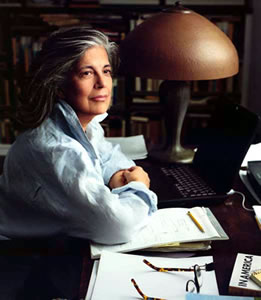
Susan Sontag (16 januari 1933 – 28 december 2004)
De Duitse schrijver Reinhard Jirgl werd op 16 januari 1953 in Oost-Berlijn geboren. Zie ook mijn blog van 16 januari 2007 en ook mijn blog van 16 januari 2008 en ook mijn blog van 16 januari 2009.
Uit: Die Stille
“–Und wenn schon nicht in den Mittelpunkt Derwelt, so waren seine Auftritte genau das rechte, um eine=gewisse Sorte von Frauen anzulocken & sie mit dem hellen Schein seiner nie verlöschenden
Redelampen in seine Fänge zu treiben. Allen voran die Tochter des Wirts: Theresa.
–Aber so erzählt, Lizi, kämes viel zu schlau&listig, viel zu ausgekocht für ihn heraus, für diesen Partikulier mit seinem für die Eismonate eingemotteten Äppelkahn. Der ihm nich mal gehörte, den er gepachtet hatte, denn ?woher hätt der Sohn 1 ruinierten Bauern von jenseits der Oder wohl Dasgeld nehmen solln für den Kauf eines Frachtkahns. Nein, Lizi, es war gewiß anders: Er ging vor allen andern sich selber in-die-Fänge, verhedderte sich im Netz der eigenen Fant-Astereien; war am-Ende der 1zige der an all sein Gerede auch wirklich glaubte voll tiefer Überzeugung u mit Herzen’s in-Brunst so, wie kleine Kinder wenn sie Opernsänger spielen, anfangs sich bekugeln über all den opulenten Stimmen&töneschwulst, um schließlich, Tränen auf den Wangen, dem wohligen Schauder aus solch Gedröhns & bombastischen Gebärden voller Glut sich hinzugeben –
–Appro Po hingeben: Er hat sie damit gekriegt, die Wirtstochter
Theresa. Und hat sie noch vor der Hochzeit geschwängert, so daß sie heiraten !mußten Damals=35. Auch,weil TheresasVater, derWirt vom »Krug«, mit der Flinte im Anschlag dem August gedroht hatte, daß, wenn er seine Tochter entehrt, er ihn übern-Haufen-knallen wird u: sollte er dafür zehnmal unters Fallbeil kommen. Und damit nicht genug:
Er hat im Dorf auch ordentlich Stimmung gemacht gegen diesen Schwiegersohn, u: somit war die Hochzeitsfeier eben alles andre als Einefeier geworden. Denn das-ganze-Dorf blieb zuhause, verfolgte hinter den Schießscharten ihrer Butzenfenster den Hochzeitszug die Dorfstraße runter und der weiße Schleier der Braut schleifte durch den Matsch an jenem Apriltag 1935, u: niemand war da, weder Brautjungfer noch Trauzeugen, um ihr den Brautschleier zu tragen. ?Und ?er: Derherr=Bräutigam schritt aufrecht & erhobenen Kopfes, ohne Blick zur Seite, voran, als hätt er das Metermaß der recht-Schaffenheit verschluckt & könnte geraden Augs in die Sonne der Zukunft schaun –, nur seine Braut stolperte in ungewohnt hochhackigen Schuhen über Katzenkopf & Modder dieser Gegenwart hinweg –“
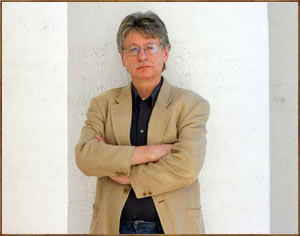
Reinhard Jirgl (Oost-Berlijn, 16 januari 1953)
De Australische schrijver en essayist Brian Castro werd geboren op 16 januari 1950 in Hongkong. Zie ook mijn blog van 16 januari 2009.
Uit: Double-Wolf
“KATOOMBA
Winter, 1978
(A misty rain is falling.
It smears the glass like somebody’s spit. Somebody talking too loud, too fast.
It is cold, but not cold enough. Not yet. In the late afternoon when it is almost dark there will be rumours of snow. Perhaps one of the last snowfalls here for all time. The eucalypts brood in the chasms, as black as the shelf of rocks worn and wet on the other side. Far better than trying to outrun fires roaring up the gorges in those mad summers. Wet black rocks fired from the bowels of another millennium.
This used to be a coal siding. ‘The Crushers’ it was called then, subsiding escarpments and waterfalls crushing the breath out of you a thousand metres above sea level on an uplifted plateau outside of Sydney. Nowadays Katoomba is littered with hotels, hospitals, mental institutions.
The mist drifts into old boarding houses, finds the damp courses, settles into rotting floorboards, drips into the stew of vegetation underneath. It’s so cold you can no longer smell anything. Your urine steams, traces a line of pain from kidneys to bladder, makes patterns of blood in the snow. But you’ll have to wait until it snows for that morsel of creativity. If it happens then you’ll have to go out in it … purge everything. The indistinction of the valleys, happily, guards against the possibility of romance and sentiment. You get tired of views.
There is a house here in Katoomba worth visiting. Nobody knows about it. Tourists visit it by chance, perhaps as an afterthought, nostalgically trying to recover the twenties or the thirties, searching for stories. They wouldn’t believe what you tell them … that a wolf once escaped from somebody’s private menagerie and roams these ridges and plateaux … or that the imagination held in check might gnaw itself to death. True, in the valley below they keep wolves. It’s illegal, not a Southern Hemisphere thing to do, un-neighbourly, what with sheep and deer farms nearby.
If you stand still now, among the low, smoky cottages you will hear somebody playing Satie’s ‘Monotones’, pausing, plunging onto what sounds like wrong notes, wrong moods, like the houses about to tumble into chasms, weatherboard, low-roofed, pitched between escarpments and valleys, out of joint even in summer when the paper petals of bougainvillea cling gaudily to their walls in a brief climax of colour.“
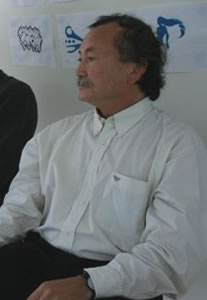
Brian Castro (Hongkong, 16 januari 1950)
De Braziliaanse schrijver, theaterproducent, talk show host, acteur, schilder en musicus Jô Soares werd geboren op 16 januari 1938 in Rio de Janeiro. Zie ook mijn blog van 16 januari 2009.
Uit: Twelve Fingers: Biography of an Anarchist
„Banja Luka, Bosnia-1897
At the same instant that the tragedy was taking place in Ouro Preto, in the Bosnian city of Banja Luka, on the banks of the Vrbas River, Dimitri Borja Korozec was born. Dimitri’s story is curious to say the least. His mother, Isabel, is a Brazilian contortionist born in São Borja in the state of Rio Grande do Sul. Daughter of a beautiful black slave from the Bantu nation and an unknown father, she came into the world on September 28, 1871, born free of the fetters of slavery: as the pampas echoed her first cries, in Rio de Janeiro Princess Isabel was signing the Law of the Free Womb, declaring that all children born to slaves were free at birth. The girl was baptized with the name of her benefactress and that of her birthplace.
As was common in such cases, the evil tongues of the town swore that the little mixed-blood girl was the illegitimate fruit of a carnal rapture of the young lieutenant colonel Manuel do Nascimento Vargas, later to be the father of Getúlio. Manuel had distinguished himself as a military hero in the Paraguayan War and, still single at the age of twenty-six, had established himself in 1870 as a rancher in São Borja. The insinuation had been vehemently denied and discounted as gossip. Nevertheless, the surprising resemblance between the little girl and the rancher had fed this slander.
In 1890, Isabel had arrived in Bosnia as part of an Italian circus. At fifteen the young woman had run away from home with an acrobat-clown, one of the Brothers Temperani, when the famous troupe had toured Brazil in 1886. In her baggage were two gifts from her mother: a photograph of Princess Isabel and the novel Mota Coqueiro, by José do Patroc�nio, the great black abolitionist hero.
In Doboj, the young woman deserts her juggling clown for Ivan Korozec, a Serbian linotypist who fell in love with the dark-skinned Brazilian woman and followed her throughout her Balkan tour. A hardened anarchist, Ivan is affiliated with the cabalistic Poluskopzi brotherhood. At that time there was an ancient secret Russian societ
y, the Skopzi, or “the Castrati of Russia,” whose adherents castrated themselves to attain spiritual wholeness. Those initiated into the Poluskopzi, or “Half Castrati,” an ultraradical sect, practice the removal of just one of the testicles: the right one. The gesture is political, symbolizing that all of their descendants will perforce be of the left. The inflexible Poluskopzi boasts fewer than forty members.“
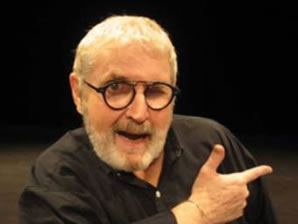
José Soares (Rio de Janeiro, 16 januari 1938)
De Amerikaanse dichter Anthony Hecht werd geboren op 16 januari 1923 in New York. Zie ook mijn blog van 16 januari 2009.
More Light! More Light!
For Heinrich Blucher and Hannah Arendt
Composed in the Tower before his execution
These moving verses, and being brought at that time
Painfully to the stake, submitted, declaring thus:
“I implore my God to witness that I have made no crime.”
Nor was he forsaken of courage, but the death was horrible,
The sack of gunpowder failing to ignite.
His legs were blistered sticks on which the black sap
Bubbled and burst as he howled for the Kindly Light.
And that was but one, and by no means one of he worst;
Permitted at least his pitiful dignity;
And such as were by made prayers in the name of Christ,
That shall judge all men, for his soul’s tranquility.
We move now to outside a German wood.
Three men are there commanded to dig a hole
In which the two Jews are ordered to lie down
And be buried alive by the third, who is a Pole.
Not light from the shrine at Weimar beyond the hill
Nor light from heaven appeared. But he did refuse.
A Luger settled back deeply in its glove.
He was ordered to change places with the Jews.
Much casual death had drained away their souls.
The thick dirt mounted toward the quivering chin.
When only the head was exposed the order came
To dig him out again and to get back in.
No light, no light in the blue Polish eye.
When he finished a riding boot packed down the earth.
The Luger hovered lightly in its glove.
He was shot in the belly and in three hours bled to death.
No prayers or incense rose up in those hours
Which grew to be years, and every day came mute
Ghosts from the ovens, sifting through crisp air,
And settled upon his eyes in a black soot.

Anthony Hecht (16 januari 1923 – 20 oktober 2004)
De Servische schrijver Aleksandar Tišma werd op 16 januari 1924 geboren in Vojvodina. Zie ook mijn blog van 16 januari 2009.
Uit: Schneck (Vertaald door Barbara Antkowiak)
„Schneck wurde vom Kopfweh wach. Die nächtliche Finsternis legte sich schwer auf seine Augen, als er sie öffnete. lch nehme eine Tablette, dachte er, dann ist es morgen früh vorbei. Er schob die Hand vor – schon diese winzige Bewegung steigerte den Schmerz -, aber noch ehe er sie bis zum Nachtschränkchen ausgestreckt hatte, fiel ihm ein, daß er nicht zu Hause war, sondern in Loznica, im Hotel, und daß seine Medikamente ganz unten im Koffer lagen, dener auf dem Bänkchen neben der Tür abgesetzt hatte. Er mochte nicht aufstehen, ängstigte sich vor den Peisn verursachenden Bewegungen; während er zögerte, fielen ihm die Augen wieder zu; und obwohl er wußte, daß er eine Dummheit beging und am nächsten Tag krank sein würde, überließ er sich dem Schlaf.
Aber am Morgen war der Schmerz verschwunden. Schneck wunderte sich; nie war er sein Kopfweh ohne Medikamente losgeworden. Er hatte Eltern, die beide häufig unter Kopfschmerzen litten, und kannte seit seiner Kindheit alle Phasen dieser Beschwernis und die entsprechenden Maßnahmen zu seiner Bekämpfung. Sein Vater war magenleidend und bekam nach üppigeren Mahlzeiten außer Leibschmerzen auch Kopfweh, und seine Mutter lief sozusagen ständig mit verbundenem Kopf umher, schon am Morgen benommen und taumelig, um sich zwischen den häuslichen Pflichten- die sie ratenweise und mit Mühe verrichtete – für ganze Stunden ins Dunkel des Schlafzimmers zurückzuziehen. Medikamente wurden hier in großen Mengen genommen, aber gerade deshalb gab es von Zeit zu Zeit Versuche, ohne sie auszukommen. Dann hörte er jedesmal den Dialog zwischen Vater und Mutter, von denen einer die Hände an die Stirn preßte: “Wird es besser?” – “Im Gegenteil, schlimmer.” – “Hast du versucht, einen Kaffee zu trinken?” – “Schon seit drei heute morgen, aber es hilft nicht.” – “Dann mußt du halt eine Tablette nehmen.” Er selbst ging so ein Risiko des Verzichts ungern ein, zumal er im Vergleich mit den Eltern seltener Kopfweh hatte: alle drei, vier Tage oder in noch größeren Abständen. Und nun hatte er sich durch Zufall davon überzeugt, daß die Beschwerden auch von selbst verschwinden konnten.“
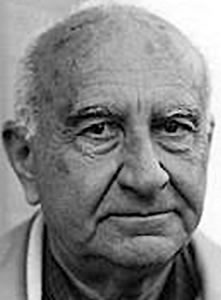
Aleksandar Tišma (16 januari 1924 – 16 februari 2003)
Zie voor nog meer schrijvers van de 16e januari ook mijn vorige blog van vandaag.
